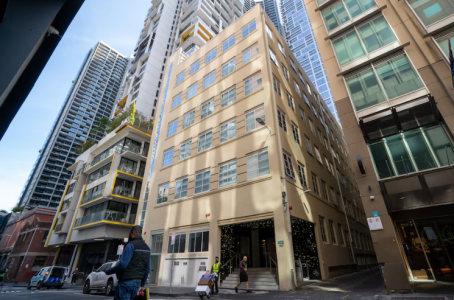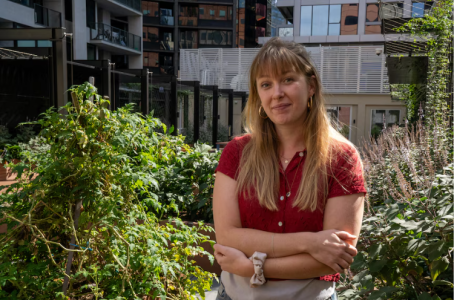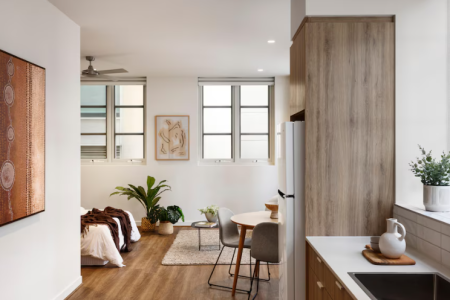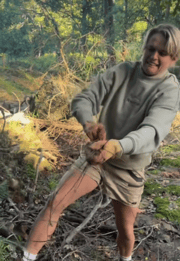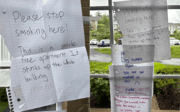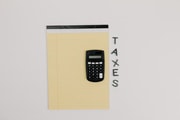Reusing empty city buildings could help solve the housing and homelessness crisis
By
ABC News
- Replies 0
Wrapped around the entrance of a building in Melbourne's CBD is a glossy artwork depicting a dark sky with luminous stars.
Perhaps it says here is a place where it will be possible to dream again — or at least get a good night's sleep.
Beyond the starry foyer is a six-story council-owned building. Called Make Room, it has been transformed into 50 homes for people who were experiencing homelessness. Before it was renovated, the building was being used for storage by the City of Melbourne. A graveyard of parade floats and memorabilia from past Moomba Festivals sat gathering dust in otherwise empty rooms.
In the middle of a housing crisis, when a sizeable amount of commercial real estate is sitting vacant, the Make Room project is billed as a blueprint for giving under-utilised buildings new life as residential spaces and lowering carbon emissions in the process.
And at a time when some councils are criminalising homelessness, Make Room is looking for a solution.
James King, CEO of non-profit housing provider Unison Housing which operates Make Room, says he's unaware of any other projects where a local council has taken the lead on addressing housing shortages and homelessness in this way. "They put the property up and then they also underwrote the entire project," he says.
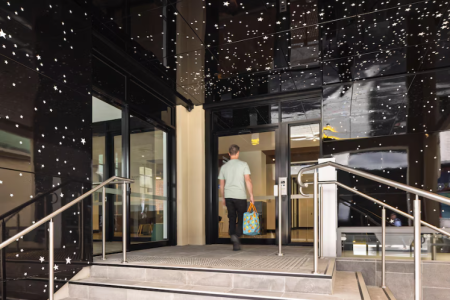
Addressing housing shortages
The empty building Make Room took over is a relic of a bygone young city. These days it is dwarfed by the glassy skyscrapers that surround it. When it was built as an electricity supply building it helped power "the expansion of the city", according to heritage review documents. Now, it might help create the city of the future again.
Almost a fifth of Melbourne's office spaces are empty, according to the Property Council of Australia – the highest CBD office vacancy in the country. While the national vacancy rate — for both CBD and non-CBD offices — was 14.7 per cent in January when the data was collated.
From a sustainability perspective, repurposing and recycling — rather than demolishing an existing structure and building a new one — is desirable. Building a new structure uses more materials and creates more embodied carbon — the carbon emissions associated with the materials and construction process.
But converting commercial buildings, particularly offices, into homes pose challenges.
Gavin Salt of i2C Architects, which designed Make Room, says improving the building's accessibility and thermal performance while working within a heritage overlay was the most challenging aspect of the project. But Salt says the building had some characteristics ("great floor to floor heights and access to natural day light… [and] shape and building structure") which lent itself easily to conversion — something many office buildings don't have.
The City of Melbourne has established guidelines to encourage building owners to repurpose under-utilised mid-tier office buildings — and improve their energy efficiency. Melbourne Lord Mayor Nick Reece says such transformations are key to addressing "urban challenges such as a growing housing shortage”. It is also central to the council’s aim of reaching 100 per cent renewable energy use by 2030 and zero net emissions by 2040.
In 2023, then-Lord Major Sally Capp said commercial buildings accounted for “almost 60 per cent of the city’s carbon emissions”. “Melbourne needs to retrofit about 80 properties each year to meet our climate goals. Currently, we average seven,” she said.
Across the county, the commercial building sector is responsible for around 25 per cent of overall electricity use and 10 per cent of total carbon emissions in Australia, according to the federal environment department.
Housing First... sort of
Make Room, which cost $24.9 million – $9.1 million paid by council and the rest by the state government and philanthropists – gives residents 12-month leases in small, self-contained studio apartments along with support-staff to help them build a life off the streets (this includes access to specialist health services such as mental health care, podiatry, physiotherapy, dietetics and dental care).
The Victorian government has provided $5.2 million over two years for on-site support and tenancy management. It did not respond to specific ABC questions asking if it would continue to fund Make Room after the initial operational funding is exhausted.
Make Room follows many of the principles of the Housing First policy developed in the US in the 1990s, which gives people experiencing homelessness immediate permanent housing, then provides wrap-around support services. The model doesn't place conditions, such as adherence to mental health or drug and alcohol treatment programs, as a prerequisite.
Celine Kostense, Unison's Housing First Practice Lead, says if people "don't have to worry 'where am I going to sleep tonight?' what we see is that they can focus on different areas in their lives". Maybe this is re-connecting with family, addressing health or substance abuse issues, learning how to become a responsible tenant, striving for a job or education or contributing to their local community.
Kostense, who is Dutch and has worked on Housing First programs in the Netherlands, says she'll never forget the first time she gave someone the keys to their own house in Amsterdam. "It wasn't just the house, it was her life… That made me feel like I can literally work together with someone to create a new life."
According to a 2022 evidence review by the Australian Housing and Urban Research Institute, the Housing First model is "highly effective" in providing housing stability to people with a history of homelessness and a "cost effective" way to support people with complex needs.
But King calls Make Room a "quasi" Housing First project because it doesn't provide permanent housing — possibly the most fundamental aspect of the model. "We're applying Housing First principles in the sense that it's trauma informed, it's immediate, there aren't conditions on [people] moving into the building and we address a range of other needs once they're housed, but that long-term permanent, secure housing I think is a really critical element [of Housing First]."
There is a question mark hanging above residents' heads at Make Room: where will they go next?
'Not in the business of making people homeless'
Make Room aims to transition residents into long-term accommodation within 12 months, but King says the time frame is flexible.
"If that housing and support is not available come the 12 months, I'm not in the business of making people homeless again. So those residents will stay," he says.
Part of Make Room's purpose, according to King, is breaking down stigma among housing providers who see former rough sleepers as "a challenging cohort to house".
"We're hoping that their time at Make Room will give a lot of Community Housing providers confidence that … [residents] can sustain a tenancy, that they can abide by their lease agreement, and they can be meaningful contributors to that community," he says.
Then there is the larger problem that up to this point no-one has been able to solve: there simply isn't enough housing available. There are now more than 55,000 people on the waitlist for social housing in Victoria alone. Even if social housing were available, many residents would need continued supportive accommodation after their time at Make Room, King says.
The City of Melbourne's attempt to fund a pathway out of homelessness is a marked contrast to councils seeking to penalise rough sleepers. Recently, Moreton Bay Council declared all homeless camping on public land would be illegal and then began throwing homeless campers' tents into garbage trucks. In nearby Brisbane, Lord Mayor Adrian Schrinner threatened to move on homeless people.
And in Melbourne, The Age reported that City of Port Phillip councillors are investigating changing local laws to prohibit people from sleeping rough on council land. (Although City of Port Phillip is also contributing $5.1 million to the development of 26 social housing units.)
"We're in the middle of a housing and homelessness crisis… we all need to play our part in creating and finding a solution," Melbourne Lord Mayor Nick Reece says.
Reece presides over a city which has an estimated shortfall of 6,000 affordable rentals. "If we do nothing this will almost quadruple to more than 23,000 by 2036," he says.
Make Room demonstrates, according to Salt, "the viability of converting commercial spaces to residential" and he hopes it will inspire other projects.
"We need to look at innovative ways of providing more housing quicker and more efficiently," he says.
His colleague Claire Bowles says: "There is a huge danger we won't meet our environmental commitments if we don't accelerate the case for the productive use of empty and underperforming buildings.
"Not only for the sake of sufficiency and embodied carbon but also for much needed housing and social infrastructure quicker and at a lower cost."
Written by Rhiannon Stevens, ABC News.
Perhaps it says here is a place where it will be possible to dream again — or at least get a good night's sleep.
Beyond the starry foyer is a six-story council-owned building. Called Make Room, it has been transformed into 50 homes for people who were experiencing homelessness. Before it was renovated, the building was being used for storage by the City of Melbourne. A graveyard of parade floats and memorabilia from past Moomba Festivals sat gathering dust in otherwise empty rooms.
In the middle of a housing crisis, when a sizeable amount of commercial real estate is sitting vacant, the Make Room project is billed as a blueprint for giving under-utilised buildings new life as residential spaces and lowering carbon emissions in the process.
And at a time when some councils are criminalising homelessness, Make Room is looking for a solution.
James King, CEO of non-profit housing provider Unison Housing which operates Make Room, says he's unaware of any other projects where a local council has taken the lead on addressing housing shortages and homelessness in this way. "They put the property up and then they also underwrote the entire project," he says.

Artist Matthew Harris designed the artwork at the entrance of Make Room. (Supplied: City of Melbourne)
The empty building Make Room took over is a relic of a bygone young city. These days it is dwarfed by the glassy skyscrapers that surround it. When it was built as an electricity supply building it helped power "the expansion of the city", according to heritage review documents. Now, it might help create the city of the future again.
Almost a fifth of Melbourne's office spaces are empty, according to the Property Council of Australia – the highest CBD office vacancy in the country. While the national vacancy rate — for both CBD and non-CBD offices — was 14.7 per cent in January when the data was collated.
From a sustainability perspective, repurposing and recycling — rather than demolishing an existing structure and building a new one — is desirable. Building a new structure uses more materials and creates more embodied carbon — the carbon emissions associated with the materials and construction process.
But converting commercial buildings, particularly offices, into homes pose challenges.
Gavin Salt of i2C Architects, which designed Make Room, says improving the building's accessibility and thermal performance while working within a heritage overlay was the most challenging aspect of the project. But Salt says the building had some characteristics ("great floor to floor heights and access to natural day light… [and] shape and building structure") which lent itself easily to conversion — something many office buildings don't have.
The City of Melbourne has established guidelines to encourage building owners to repurpose under-utilised mid-tier office buildings — and improve their energy efficiency. Melbourne Lord Mayor Nick Reece says such transformations are key to addressing "urban challenges such as a growing housing shortage”. It is also central to the council’s aim of reaching 100 per cent renewable energy use by 2030 and zero net emissions by 2040.
Across the county, the commercial building sector is responsible for around 25 per cent of overall electricity use and 10 per cent of total carbon emissions in Australia, according to the federal environment department.
Housing First... sort of
Make Room, which cost $24.9 million – $9.1 million paid by council and the rest by the state government and philanthropists – gives residents 12-month leases in small, self-contained studio apartments along with support-staff to help them build a life off the streets (this includes access to specialist health services such as mental health care, podiatry, physiotherapy, dietetics and dental care).
The Victorian government has provided $5.2 million over two years for on-site support and tenancy management. It did not respond to specific ABC questions asking if it would continue to fund Make Room after the initial operational funding is exhausted.
Make Room follows many of the principles of the Housing First policy developed in the US in the 1990s, which gives people experiencing homelessness immediate permanent housing, then provides wrap-around support services. The model doesn't place conditions, such as adherence to mental health or drug and alcohol treatment programs, as a prerequisite.
Celine Kostense, Unison's Housing First Practice Lead, says if people "don't have to worry 'where am I going to sleep tonight?' what we see is that they can focus on different areas in their lives". Maybe this is re-connecting with family, addressing health or substance abuse issues, learning how to become a responsible tenant, striving for a job or education or contributing to their local community.
Kostense, who is Dutch and has worked on Housing First programs in the Netherlands, says she'll never forget the first time she gave someone the keys to their own house in Amsterdam. "It wasn't just the house, it was her life… That made me feel like I can literally work together with someone to create a new life."
According to a 2022 evidence review by the Australian Housing and Urban Research Institute, the Housing First model is "highly effective" in providing housing stability to people with a history of homelessness and a "cost effective" way to support people with complex needs.
But King calls Make Room a "quasi" Housing First project because it doesn't provide permanent housing — possibly the most fundamental aspect of the model. "We're applying Housing First principles in the sense that it's trauma informed, it's immediate, there aren't conditions on [people] moving into the building and we address a range of other needs once they're housed, but that long-term permanent, secure housing I think is a really critical element [of Housing First]."
There is a question mark hanging above residents' heads at Make Room: where will they go next?
Make Room aims to transition residents into long-term accommodation within 12 months, but King says the time frame is flexible.
"If that housing and support is not available come the 12 months, I'm not in the business of making people homeless again. So those residents will stay," he says.
Part of Make Room's purpose, according to King, is breaking down stigma among housing providers who see former rough sleepers as "a challenging cohort to house".
"We're hoping that their time at Make Room will give a lot of Community Housing providers confidence that … [residents] can sustain a tenancy, that they can abide by their lease agreement, and they can be meaningful contributors to that community," he says.
Then there is the larger problem that up to this point no-one has been able to solve: there simply isn't enough housing available. There are now more than 55,000 people on the waitlist for social housing in Victoria alone. Even if social housing were available, many residents would need continued supportive accommodation after their time at Make Room, King says.
The City of Melbourne's attempt to fund a pathway out of homelessness is a marked contrast to councils seeking to penalise rough sleepers. Recently, Moreton Bay Council declared all homeless camping on public land would be illegal and then began throwing homeless campers' tents into garbage trucks. In nearby Brisbane, Lord Mayor Adrian Schrinner threatened to move on homeless people.
And in Melbourne, The Age reported that City of Port Phillip councillors are investigating changing local laws to prohibit people from sleeping rough on council land. (Although City of Port Phillip is also contributing $5.1 million to the development of 26 social housing units.)
"We're in the middle of a housing and homelessness crisis… we all need to play our part in creating and finding a solution," Melbourne Lord Mayor Nick Reece says.
Reece presides over a city which has an estimated shortfall of 6,000 affordable rentals. "If we do nothing this will almost quadruple to more than 23,000 by 2036," he says.
Make Room demonstrates, according to Salt, "the viability of converting commercial spaces to residential" and he hopes it will inspire other projects.
"We need to look at innovative ways of providing more housing quicker and more efficiently," he says.
His colleague Claire Bowles says: "There is a huge danger we won't meet our environmental commitments if we don't accelerate the case for the productive use of empty and underperforming buildings.
"Not only for the sake of sufficiency and embodied carbon but also for much needed housing and social infrastructure quicker and at a lower cost."
Written by Rhiannon Stevens, ABC News.


